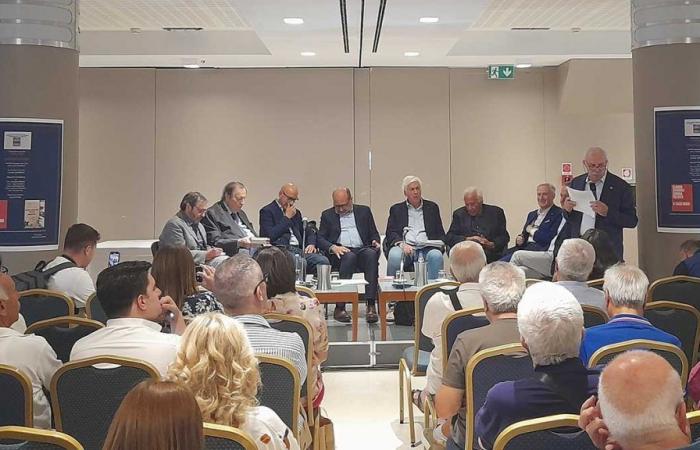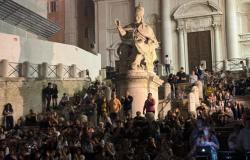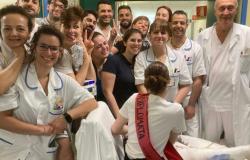
In the name of remembrance and reflection, the Association of Former Regional Councilors and Parliamentarians of Basilicata organized an event of great cultural importance on Tuesday 18 June, at the Hotel San Domenico, in Matera, thanks to the commitment and dedication of the its President, Aldo Michele Radice. In the spotlight, the presentation of two books that scrutinize crucial moments in the history of Italian politics: “Berlinguer must die” by Giovanni Fasanella and Corrado Incerti and “Il caso Moro” by Claudio Signorile and Simona Colarizi.
The choice of books is not random: both deal with episodes that have profoundly affected politics, and through an open and stimulating dialogue, Giovanni Fasanella and Claudio Signorile have offered new perspectives on the dynamics and implications that still influence our country today.
President Radice, originally from San Fele and a prominent figure who has held important roles as Director of the Regional Council and Council, Councilor and President of the Regional Council of Basilicata, speaking to our microphones, highlighted the importance of historical memory. He remembered emblematic figures such as Moro and Berlinguer, underlining that “they made the history of Italy in a particular period. They represented a prototype of politicians that is difficult to find today.” Furthermore, he provided advice to young people, urging them to “inform themselves and not distance themselves from politics, because it is politics that decides everyone’s destinies. Avoiding it, not dealing with it, is a mistake. Instead, we need to inform ourselves, read, delve deeper and become passionate about politics”, underlining how delving into these issues with those who have experienced them brings politics closer.
Giovanni Fasanella, brilliant journalist and essayist, as well as quirinalist and parliamentary editor also originally from San Fele, in his book ‘Berlinguer must die’, published in 2014 on the occasion of the thirtieth anniversary of Berlinguer’s death in 1984, addresses issues of great importance historical. After an official visit to Bulgaria, talks between Enrico Berlinguer, secretary of the PCI, and Todor Zhivkov, secretary of the Bulgarian Communist Party, prove fruitless due to their opposing ideas, leading to an early departure of the Italian leader. On 3 October 1973, on the road to the airport, a military truck hits Berlinguer’s car, who miraculously saves himself, but with the consequent death of his interpreter and the wounding of two Bulgarian communist leaders who themselves were at odds with Zhivkov’s political ideas. The incident remained shrouded in silence until 1991, when Emanuele Macaluso, former leader of the PCI and close collaborator of Berlinguer, revealed to Fasanella, who was working for Panorama at the time, the possibility of a conspiracy, orchestrated by the communist governments of East. This hypothesis is denied by the leaders of the PCI, but confirmed by Berlinguer’s wife, Mrs. Letizia. The search for evidence extends from the archives of the Gramsci Institute to the Mitrokhin dossier, trying to shed light on the truth behind the incident. This is a journalistic investigation which, according to what the author declared, reveals: “Remarkable new elements because it allows us to reconstruct the other pole of the Moro affair, namely the Soviet and Eastern countries’ intervention in internal affairs Italian. It has always been thought that the strategy of tension was exclusively the responsibility of the United States of America and the CIA; instead, as demonstrated by this investigation into the attack on Berlinguer which took place in Sofia in 1973, there is also action on the part of the conservatives of the Brezhnevian communist world”.
We also asked Fasanella the question about the possible historical implications if Berlinguer had died in the Sofia accident, wondering how this could have influenced the fate of Aldo Moro. He replied: “Of course, a hypothetical question cannot be answered with certainty. What can however be reasonably said is that, if Berlinguer had died in that attack in 1973, the number two of the communist party, Armando Cossutta, the most pro-Soviet of the communist leaders, would have taken his place. The reformer, the heretic Berlinguer, would be replaced by an Orthodox pro-Soviet leader. The Communist Party would have lost influence over large sections of Italian society and would have remained in the ghetto. Therefore, we can assume that there would have been no need, five years later, to kidnap and murder Aldo Moro.”
Regarding the nature of the relations between the Italian Communist Party and the Eastern Communist Parties during the Cold War, Fasanella pointed out that: “The relations were very complicated and ambiguous in certain respects. The Italian Communist Party was a party that had participated in the Resistance, which had signed the democratic Constitution, but at the same time it had a very close relationship with the Eastern world, with Soviet communism. Relationships not only of an ideological nature but also organizational and economic. Up to a certain point, the Italian Communist Party was heavily financed by the Soviets. However, it was a party that, albeit gradually and through a complicated process of contradictions, problems and slowness, had begun a process of emancipation from Soviet communism. One can reasonably assume that, over time, Berlinguer’s objective, even if not openly declared at the time, would have been achieved: that of bringing the Italian Communist Party into the great family of European Socialism and Social Democracies”.
Claudio Signorile, university professor and well-known Italian politician, Minister for Extraordinary Interventions for the South with the Spadolini and Fanfani Governments and for Transport with the Craxi Government as well as Deputy Secretary of the Italian Socialist Party at the time when the Secretary was Bettino Craxi himself, has presented the book “Il Caso Moro”, on sale from 10 May 2024, a two-voice dialogue focused on the crucial events of the 70s, a troubled period in which the actions and decisions of political parties, secret services and of the Curia, recognizing that the tragic fate of Aldo Moro was not a predictable outcome. This event caused a significant fracture in the political system of the time, destroying the possibility of a “Historical Compromise” that could have changed the course of events on an international level.
In response to our question about his motivations for writing about the Moro case years after his assassination, Signorile offered us an in-depth perspective. She emphasized that: “It is not a written book; it is a conversation between me and professor Simona Colarizi, who is one of the most important contemporary historians in Italy. The objective of this book is historical, not only political: that of trying to understand not who killed Moro, nor to unravel a criminal act or a spy story, but why Moro was killed, that is, in which historical context, in which conditions, what were the reasons that led to Moro’s assassination. This political death, this political assassination, must be clearly highlighted. If you consider Moro’s death as an act of the Red Brigades, you are wrong; of course, it is that too, but the context in which Moro is murdered is a political context.”
We then asked the Socialist Deputy Secretary to clarify the reasons that prevented the success of the negotiations he conducted for the release of the Hon. Moro, and Signorile responded by saying that: “It was not a negotiation, because the conditions for the negotiation were not there; it was the construction of a unilateral act of humanity, therefore the liberation of a prisoner who had not committed bloody acts, to allow the first step: that of the suspension of the sentence that had been issued by the members of the Red Brigades who had Moro in their hands, in which they said that he would have been killed. Here, opening the door to a path that could actually lead to the liberation of Moro on the one hand and probably to an act of further humanity towards some members of the Red Brigades and prisoners, but all this was simply set up and started; I did it, but it never managed to become a concrete element because, just when the Christian Democratic Leadership was supposed to meet, which should have given a green light, or at least an opening, Moro was killed, he was killed in the night between on May 8th and 9th, and that’s why we said to ourselves: why? It is a death so clearly critical that it cannot be entrusted solely to a criminal reading; there must be a more complete understanding of what was happening, and we understood this well: we did not want to change the balance which, after the victory of the Second World War and the implementation of the Yalta agreements, had to remain stable and immobile”. He then added a fundamental aspect on the British involvement in the Moro case: “Not England, but the Services, the English Intelligence; we were a bit like special guards. There was a constant presence of Intelligence attention on what was happening in Italy and, in particular, around the Moro affair.”
The event saw the participation of the Hon. Salvatore Adduce, Sen. Filippo Bubbico, Sen. Nicola Buccico, Sen. Cosimo Latronico, and the Hon. Vincenzo Viti, eager to pay homage to two giants of republican history. The journalist Pasquale Doria moderated the meeting. The initiative proved to be a great success, receiving unanimous appreciation from the participants, who followed the interventions with keen interest. Furthermore, the series of meetings will continue with the next appointment scheduled in Potenza on 5 July, at the Provincial Archaeological Museum. It will be an extraordinary opportunity to delve deeper into our republican history and to share moments of dialogue and cultural reflection. You will also have the opportunity to meet and get to know Claudio Signorile and Giovanni Fasanella personally, two key figures for understanding the historical events at the center of the discussion.
Filomena Dattoli





